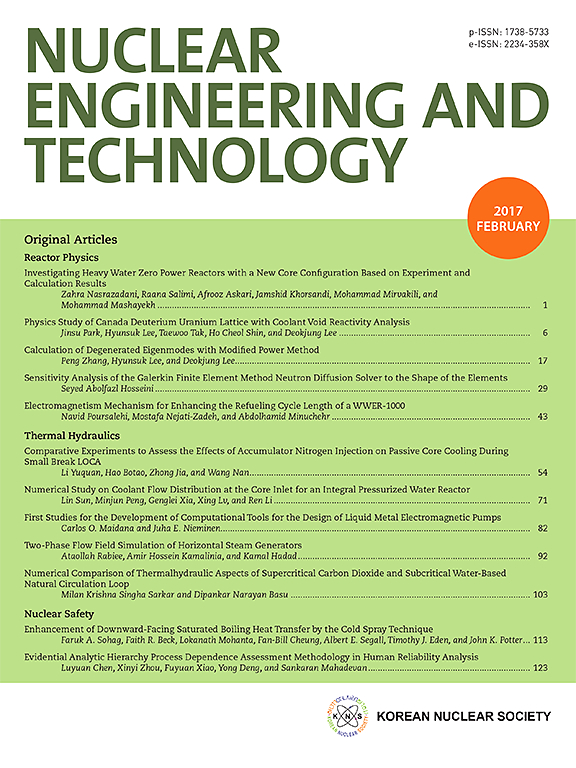一次质量流量变化率对蒸汽发生器并联u型管流动不稳定性影响的研究
IF 2.6
3区 工程技术
Q1 NUCLEAR SCIENCE & TECHNOLOGY
引用次数: 0
摘要
目前的研究表明,在自然循环条件下,并联蒸汽发生器u型管中的逆流现象严重降低了循环能力,影响了船用核电站的运行安全。在强制循环向自然循环过渡阶段,蒸汽发生器一次质量流量急剧下降,产生复杂的逆流现象。针对上述问题,本文基于蒸汽发生器实验回路,采用实验方法测量了蒸汽发生器一次质量流量变化率对逆流的影响。结果表明:随着一次质量流量变化率的增大,并联u型管的临界质量流量明显减小,而临界压降基本不变;此外,还使用RELAP5代码分析了该机制。研究结果可为船舶核电站运行安全分析提供必要的技术支持。本文章由计算机程序翻译,如有差异,请以英文原文为准。
Investigations on effect of primary mass flow change rate on flow instability among parallel U-tubes of steam generator
Current investigations reveal that reverse flow phenomena in parallel steam generator U-tubes under natural circulation significantly reduce circulation capacity, compromising operational safety of marine nuclear power plant. During transitional phases from forced to natural circulation, the steam generator's primary mass flow rate experiences an abrupt decline, inducing complex reverse flow phenomena. To solve the above problems, this paper used experimental methods to measure the effect of the steam generator primary mass flow change rate on the reverse flow based on the steam generator experimental loop. The results demonstrated that with an increase in the primary mass flow change rate, the critical mass flow rate of parallel U-tubes decreased obviously, while the critical pressure drop remained nearly unchanged. In addition, the mechanism was analyzed using the RELAP5 code. The results can facilitate the technical supportnecessary for the operation safety analysis of marine nuclear power plant.
求助全文
通过发布文献求助,成功后即可免费获取论文全文。
去求助
来源期刊

Nuclear Engineering and Technology
工程技术-核科学技术
CiteScore
4.80
自引率
7.40%
发文量
431
审稿时长
3.5 months
期刊介绍:
Nuclear Engineering and Technology (NET), an international journal of the Korean Nuclear Society (KNS), publishes peer-reviewed papers on original research, ideas and developments in all areas of the field of nuclear science and technology. NET bimonthly publishes original articles, reviews, and technical notes. The journal is listed in the Science Citation Index Expanded (SCIE) of Thomson Reuters.
NET covers all fields for peaceful utilization of nuclear energy and radiation as follows:
1) Reactor Physics
2) Thermal Hydraulics
3) Nuclear Safety
4) Nuclear I&C
5) Nuclear Physics, Fusion, and Laser Technology
6) Nuclear Fuel Cycle and Radioactive Waste Management
7) Nuclear Fuel and Reactor Materials
8) Radiation Application
9) Radiation Protection
10) Nuclear Structural Analysis and Plant Management & Maintenance
11) Nuclear Policy, Economics, and Human Resource Development
 求助内容:
求助内容: 应助结果提醒方式:
应助结果提醒方式:


